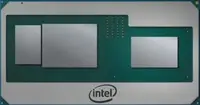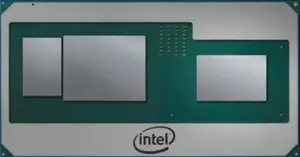| Edit Values | |
| Core i7-8706G | |
 | |
| Package front | |
| General Info | |
| Designer | Intel, AMD |
| Manufacturer | Intel, GlobalFoundries |
| Model Number | i7-8706G |
| Market | Mobile |
| Introduction | January 7, 2018 (announced) January 7, 2018 (launched) |
| Shop | Amazon |
| General Specs | |
| Family | Core i7 |
| Series | i7-8000 |
| Locked | Yes |
| Frequency | 3,100 MHz |
| Turbo Frequency | 4,100 MHz (1 core) |
| Bus type | DMI 3.0 |
| Bus rate | 4 × 8 GT/s |
| Clock multiplier | 31 |
| Microarchitecture | |
| ISA | x86-64 (x86) |
| Microarchitecture | Kaby Lake |
| Platform | Kaby Lake |
| Chipset | Sunrise Point, Union Point |
| Core Name | Kaby Lake G |
| Core Family | 6 |
| Process | 14 nm |
| Technology | CMOS |
| Word Size | 64 bit |
| Cores | 4 |
| Threads | 8 |
| Max Memory | 64 GiB |
| Multiprocessing | |
| Max SMP | 1-Way (Uniprocessor) |
| Electrical | |
| TDP | 65 W |
Core i7-8706G is a 64-bit quad-core high-end performance x86 mobile microprocessor introduced by Intel in early 2018. This processor, which is based on the Kaby Lake microarchitecture, is manufactured on Intel's improved 14nm+ process. The i7-8706G operates at 3.1 GHz with a TDP of 65 W and a Turbo Boost frequency of up to 4.1 GHz. This MPU supports up to 64 GiB of dual-channel DDR4-2400 memory and incorporates Intel's HD Graphics 630 IGP operating at 350 MHz with a burst frequency of 1.1 GHz. Additionally, this processor also incorporates a discrete Radeon RX Vega M GL GPU operating at up to 1.011 GHz with its own 4 GiB of high-bandwidth memory operating at 700 MHz.
Contents
Cache
- Main article: Kaby Lake § Cache
|
Cache Organization
Cache is a hardware component containing a relatively small and extremely fast memory designed to speed up the performance of a CPU by preparing ahead of time the data it needs to read from a relatively slower medium such as main memory. The organization and amount of cache can have a large impact on the performance, power consumption, die size, and consequently cost of the IC. Cache is specified by its size, number of sets, associativity, block size, sub-block size, and fetch and write-back policies. Note: All units are in kibibytes and mebibytes. |
|||||||||||||||||||||||||||||||||||||
|
|||||||||||||||||||||||||||||||||||||
Memory controller
|
Integrated Memory Controller
|
||||||||||||||
|
||||||||||||||
HBM 2
This processor also incorporates 4 GiB of high-bandwidth memory 2 which are tightly connected to the GPU via Intel's EMIB. This HBM is 1,024-bit wide and operates at 700 MHz.
|
Integrated Memory Controller
|
||||||||||
|
||||||||||
Expansions
This processor has 16 PCIe lanes, however 8x of them are taken for the discrete GPU, leaving 8x more for general purpose.
Expansion Options |
|||||
|
|||||
Graphics
This processor has two graphics processors:
- HD Graphics 630 GPU, same die
- Custom Radeon RX Vega M Graphics GPU, same package
Note that both GPUs are enabled and both can be operated independently.
Integrated graphics
|
Integrated Graphics Information
|
||||||||||||||||||||||||||||||||||||||||||||||||||||||||||||||||||||
|
||||||||||||||||||||||||||||||||||||||||||||||||||||||||||||||||||||
| [Edit] Kaby Lake (Gen9.5) Hardware Accelerated Video Capabilities | |||||||
|---|---|---|---|---|---|---|---|
| Codec | Encode | Decode | |||||
| Profiles | Levels | Max Resolution | Profiles | Levels | Max Resolution | ||
| MPEG-2 (H.262) | Main | High | 1080p (FHD) | Main | Main, High | 1080p (FHD) | |
| MPEG-4 AVC (H.264) | High, Main | 5.1 | 2160p (4K) | Main, High, MVC, Stereo | 5.1 | 2160p (4K) | |
| JPEG/MJPEG | Baseline | - | 16k x 16k | Baseline | Unified | 16k x 16k | |
| HEVC (H.265) | Main, Main 10 | 5.1 | 2160p (4K) | Main, Main 10 | 5.1 | 2160p (4K) | |
| VC-1 | ✘ | Advanced, Main, Simple | 3, High, Simple | 3840x3840 | |||
| VP8 | Unified | Unified | N/A | 0 | Unified | 1080p | |
| VP9 | 0 | 2160p (4K) | 0, 2 | Unified | 2160p (4K) | ||
Discrete graphics
This processor also has a Radeon RX Vega M GL with a peak performance of 2.6 TFLOPS.
|
Integrated Graphics Information
|
||||||||||||||||||||||||||||||||||||||||||||
|
||||||||||||||||||||||||||||||||||||||||||||
Features
[Edit/Modify Supported Features]
| Has subobject "Has subobject" is a predefined property representing a container construct and is provided by Semantic MediaWiki. | Core i7-8706G - Intel#pcie + |
| base frequency | 3,100 MHz (3.1 GHz, 3,100,000 kHz) + |
| bus links | 4 + |
| bus rate | 8,000 MT/s (8 GT/s, 8,000,000 kT/s) + |
| bus type | DMI 3.0 + |
| chipset | Sunrise Point + and Union Point + |
| clock multiplier | 31 + |
| core count | 4 + |
| core family | 6 + |
| core name | Kaby Lake G + |
| designer | Intel + and AMD + |
| device id | 0x5912 + |
| family | Core i7 + |
| first announced | January 7, 2018 + |
| first launched | January 7, 2018 + |
| full page name | intel/core i7/i7-8706g + |
| has advanced vector extensions | true + |
| has advanced vector extensions 2 | true + |
| has ecc memory support | false + |
| has feature | Advanced Vector Extensions +, Advanced Vector Extensions 2 +, Advanced Encryption Standard Instruction Set Extension +, Hyper-Threading Technology +, Turbo Boost Technology 2.0 +, Enhanced SpeedStep Technology +, Intel vPro Technology +, Intel VT-x +, Intel VT-d +, Transactional Synchronization Extensions +, Memory Protection Extensions +, Software Guard Extensions +, Secure Key Technology +, OS Guard + and Identity Protection Technology + |
| has intel enhanced speedstep technology | true + |
| has intel identity protection technology support | true + |
| has intel secure key technology | true + |
| has intel supervisor mode execution protection | true + |
| has intel turbo boost technology 2 0 | true + |
| has intel vpro technology | true + |
| has intel vt-d technology | true + |
| has intel vt-x technology | true + |
| has locked clock multiplier | true + |
| has simultaneous multithreading | true + |
| has transactional synchronization extensions | true + |
| has x86 advanced encryption standard instruction set extension | true + |
| instance of | microprocessor + |
| integrated gpu | HD Graphics 630 + and Radeon RX Vega M GL + |
| integrated gpu base frequency | 350 MHz (0.35 GHz, 350,000 KHz) + and 931 MHz (0.931 GHz, 931,000 KHz) + |
| integrated gpu designer | Intel + and AMD + |
| integrated gpu execution units | 24 + |
| integrated gpu max frequency | 1,100 MHz (1.1 GHz, 1,100,000 KHz) + and 1,011 MHz (1.011 GHz, 1,011,000 KHz) + |
| integrated gpu max memory | 65,536 MiB (67,108,864 KiB, 68,719,476,736 B, 64 GiB) + and 4,096 MiB (4,194,304 KiB, 4,294,967,296 B, 4 GiB) + |
| isa | x86-64 + |
| isa family | x86 + |
| l1$ size | 256 KiB (262,144 B, 0.25 MiB) + |
| l1d$ description | 8-way set associative + |
| l1d$ size | 128 KiB (131,072 B, 0.125 MiB) + |
| l1i$ description | 8-way set associative + |
| l1i$ size | 128 KiB (131,072 B, 0.125 MiB) + |
| l2$ description | 4-way set associative + |
| l2$ size | 1 MiB (1,024 KiB, 1,048,576 B, 9.765625e-4 GiB) + |
| l3$ description | 16-way set associative + |
| l3$ size | 8 MiB (8,192 KiB, 8,388,608 B, 0.00781 GiB) + |
| ldate | 3000 + |
| main image |  + + |
| main image caption | Package front + |
| manufacturer | Intel + and GlobalFoundries + |
| market segment | Mobile + |
| max cpu count | 1 + |
| max memory | 65,536 MiB (67,108,864 KiB, 68,719,476,736 B, 64 GiB, 0.0625 TiB) + |
| max memory bandwidth | 35.76 GiB/s (36,618.24 MiB/s, 38.397 GB/s, 38,397.008 MB/s, 0.0349 TiB/s, 0.0384 TB/s) + and 166.9 GiB/s (170,905.6 MiB/s, 179.208 GB/s, 179,207.51 MB/s, 0.163 TiB/s, 0.179 TB/s) + |
| max memory channels | 2 + |
| microarchitecture | Kaby Lake + |
| model number | i7-8706G + |
| name | Core i7-8706G + |
| platform | Kaby Lake + |
| process | 14 nm (0.014 μm, 1.4e-5 mm) + |
| series | i7-8000 + |
| smp max ways | 1 + |
| supported memory type | DDR3L-1600 +, DDR4-2400 + and HBM2 + |
| tdp | 65 W (65,000 mW, 0.0872 hp, 0.065 kW) + |
| technology | CMOS + |
| thread count | 8 + |
| turbo frequency (1 core) | 4,100 MHz (4.1 GHz, 4,100,000 kHz) + |
| word size | 64 bit (8 octets, 16 nibbles) + |
| x86/has memory protection extensions | true + |
| x86/has software guard extensions | true + |
